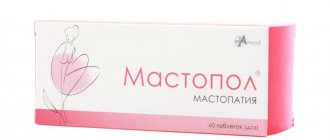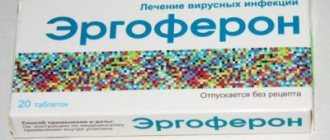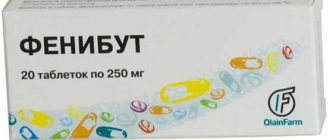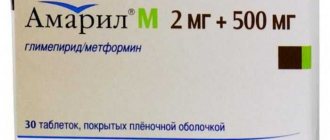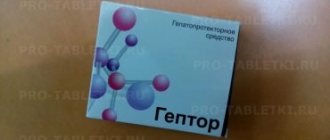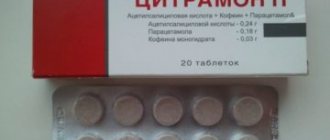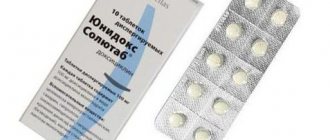Release form and composition
The drug is available in the following dosage forms:
- In the form of drops for oral administration (100 g);
- In the form of syrup (100 g);
- In the form of tablets No. 20.
Drops and syrup are a transparent aromatic liquid of a light brown hue.
Active ingredients of Bronchipret in drops:
- Thyme herb extract (Thymus vulgaris) in liquid form – 50 g;
- A tincture prepared from ivy leaves (Hedera helix) in a ratio of 1:5, 70% ethanol is used as an extracting agent in a volume ratio of 15 g;
- Ethanol 19% by volume;
- Excipients.
Active ingredients of Bronchipret syrup:
- Thyme herb extract (Thymus vulgaris) in liquid form – 15 g;
- A tincture prepared from ivy leaves (Hedera helix) in a 1:1 ratio; 70% ethanol is used as an extracting agent in a volume ratio of 15 g;
- Ethanol 7% by volume;
- Excipients.
Active substances contained in tablets:
- Active ingredients of dry extract obtained from primrose root – 60 mg;
- Thyme herb extract (Thymus vulgaris) in dry form – 160 mg.
Description of the drug "Bronchipret"
Analogues of this medication will be presented to your review later in the article. But first you should find out about the drug itself. Bronchipret drops and syrup are produced in Germany. The composition includes natural plant components: thyme herb extract and ivy leaves in the form of a liquid extract. Depending on the form of the medication, additional compounds may be present. It contains medicine and ethanol, but its amount is negligible, so you don’t have to worry about the negative effects of this substance. You can purchase the drug "Bronchipret" in any pharmacy at an affordable price: no more than 300 rubles per 50 milliliters. You don't need a doctor's prescription. This medicine has proven itself well in recent years, and the demand for it is growing.
Pharmacological properties of Bronchipret
The main ingredient of the drug in all its dosage forms is the extract of the thyme herb Thymus vulgaris, which has an expectorant, mucolytic, antimicrobial, anti-inflammatory and antitussive effect on the body, and also helps relieve swelling of the bronchial mucosa. A similar effect is achieved due to the high content of essential oils in the extract, rich in phenols, the predominant of which is thymol. Passing through the respiratory tract, the essential oil provokes hyperemia of the mucosal tissues, as a result of which the production of secretions by the glands located in the layer of epithelial tissue of the bronchi increases.
The Hedera helix ivy extract included in Bronchipret contains saponins - nitrogen-free glycosides of plant origin that irritate receptors located in the tissues of the gastric mucosa, and thereby reflexively excite the vomiting center, which is localized in the medulla oblongata. As a result, the secretion of glands located in the layer of epithelial tissue of the bronchi also reflexively increases.
Once in the body, ivy extract also acts as an antispasmodic.
Primrose root extract, used to make Bronchipret tablets, includes a large amount of saponins, which provoke the separation and discharge of sputum by a reflex during a productive cough.
Analogs
There is no analogue of Bronchipret syrup for children in the full sense of the word. However, if there is a need to replace this drug with another herbal remedy, you can pay attention to the following drugs:
- Eucabal syrup. This is an effective expectorant drug. The active effect of the drug is aimed at thinning sputum. In addition, Eucabal activates the transport of secretions through the tissue cells of the mucous membranes in the trachea and bronchi. Eucabal is indicated for use in both children and adults.
- Marshmallow and licorice syrup. Indicated for lung diseases. It can be used by children starting from 2 years old. The product tastes sweet, so kids drink it with pleasure.
- Dry cough syrup. An analogue of Bronchipret syrup, represented by this mixture, has an effect similar to the first medicine. The mixture is effective for small children. You can take the medicine from the first year of the baby’s life. The drug contains licorice root, marshmallow extract, anise oil, etc.
- Gerbion. It is a herbal remedy that has a brown or reddish-brown hue. The smell is herbal, the taste is sweet. Gerbion can be taken by children starting from 2 years of age. The effect of the drug is associated with the effect on the production of mucus in the cells of the bronchi. When taking the drug, the cough becomes more productive. Sputum is released from the lungs together with the infectious agent. The patient's recovery begins. Plantain extract, which is part of the drug, has an anti-inflammatory and antibacterial effect.
- Gedelix. The medicine has an effective expectorant effect. In addition, ivy extract gives the drug an antispasmodic and mucolytic effect. The advantage of Gedelix is that the medication can be prescribed to infants. But this does not apply to drops, another form of the drug, which is prescribed only from 2 years of age.
- Overslept. The drug has an expectorant effect. In addition, it is mucolytic and also relieves bronchospasms. Prospan reduces the viscosity of sputum and helps its removal. Used as a therapeutic agent for lung diseases. The disease is accompanied by coughing and difficulty in expelling sputum. The medicine can be given to infants.
Directions for use and dosage
Bronchipret syrup is taken orally after meals. The dose is determined based on the patient’s age:
- Children over three months and up to one year: 10 drops three times a day after meals;
- Children over one year of age: 17 drops three times a day after meals, plus 3 drops for each subsequent year of the child’s life.
In cases where the drug is measured using a measuring cup, the volume of a single dose for children aged 3 to 12 months is 1.1 ml. A single dose of Bronchipret for children aged one to two years is 2.2 ml. Children from two to six years old are prescribed the drug to take 3.2 ml, the recommended dose for adolescents and adult patients is 5.4 ml.
Dosing of Bronchipret for children can also be carried out taking into account actual body weight. To calculate the optimal single dose, the following formula is used: 10 drops of the drug + 1 drop for every kilogram of the child’s body weight. The recommended frequency of doses is 3. In undiluted form, Bronchipret syrup is washed down with a sufficient amount of water.
In the form of drops, Bronchipret is taken four times during the day after meals. Adults are prescribed 40 drops, adolescents aged 12 to 18 years – 28. A single dose of Bronchipret for school-age children (from 6 to 12 years) is 25 drops.
The drug in tablet form is prescribed from the age of twelve. The daily dose is three tablets, the single dose is one. The drug is administered orally after meals. The tablet is swallowed without chewing and washed down with a sufficient amount of water.
The duration of therapy varies from 10 to 14 days. On the recommendation of the attending physician, a decision may be made to extend the course or repeat it.
Bronchipret for children
Drops are prescribed to children from six years to eleven. Single dose 25 drops, taken 4 times a day.
The drug in the form of syrup is prescribed to children from three months, 10-16 drops. Older children from one year old take 17 drops three times a day, and every year you need to add three drops.
Bronchipret tablets are prescribed to children from 12 years of age - 1 tablet. 3 robes a day.
Bronchipret side effects
Allergic reactions. In case of an overdose, pain in the stomach may occur, vomiting and diarrhea may also occur.
Bronchipret contraindications
Not recommended if the patient has some sensitivity to any components of the drug. The use of this drug is not advisable for alcoholism, if the patient has epilepsy, liver disease and brain injuries, during pregnancy and breastfeeding.
Bronchipret special instructions
During pregnancy and breastfeeding, the drug is prescribed by a doctor and the patient is strictly monitored. The drug can be taken by patients with diabetes.
Bronchipret and its interaction with other drugs.
The drug should not be taken simultaneously with antitussives or drugs that reduce the formation of sputum. Can be combined with some antibacterial medications.
Bronchipret overdose
In case of overdose, dyspepsia, vomiting and diarrhea may occur.
Contraindications
According to the instructions, Bronchipret is contraindicated:
- If the patient is hypersensitive to any of its ingredients;
- Children under three months (in syrup form), up to 6 years (in drops), up to 12 years (in tablets);
- For epilepsy;
- Patients with liver pathologies;
- People with alcohol addiction;
- Patients with diseases and traumatic brain injuries (since the drug contains ethanol).
Bronchipret is not recommended for pregnant and breastfeeding women.
Application of Bronchipret syrup
Bronchipret helps reduce the intensity of inflammatory processes in the child's respiratory tract.
It also has a secretolytic and bronchodilator effect, promotes the rapid removal of sputum, reducing its viscosity.
Bronchipret is presented on the market in the form of syrup, drops and tablets.
Bronchipret syrup is a light brown transparent liquid with an aromatic odor. The active ingredients in the syrup are liquid extracts of thyme and ivy leaves. The excipients in Bronchipret syrup are maltitol syrup, citric acid monohydrate, potassium sorbate and water. It also contains ethanol.
Thyme not only has a pronounced expectorant effect, but also has anti-inflammatory and antimicrobial effects.
This drug is used to treat infants aged three months and older. Compared to drops, syrup contains less ethanol. According to the instructions for Bronchipret, its dose for treating a child is calculated based on his body weight. The bottles in which this drug is produced are made of dark glass, their volume is 50 and 100 ml. The bottle has a built-in drip device. Measuring cup included.
Reviews about Bronchipret
This medicine literally delights many patients due to the fact that it is based on herbs. Indeed, many people are absolutely sure that herbal medicines are more useful under any conditions and cannot harm their health at all, unlike so-called “chemical” medicines. The opinion is more than controversial. But people express their admiration by leaving the following reviews: “Good old Bronchipret syrup - no chemicals, just herbs. I always treat myself with it and treat children” or “I started taking Bronchipret - the sputum began to come out the very next day. Within a few days my breath cleared and I was cured.” Some go further and compare Bronchipret with other cough medications, for example, Lazolvan or Ambrobene. Naturally, the comparison is not in favor of drugs whose annotations do not describe “herbs,” “extracts,” or extracts.”
Although some reviews about Bronchipret are too similar to an advertising campaign launched on the Internet, nevertheless, they cannot be completely written off. Thus, opinions about this medicine are overwhelmingly positive. When taking mucolytics, you need to remember that this is not always necessary for coughing. To put it simply, if the cough is wet and the sputum is well expectorated, there is no point in liquefying it even more. This will likely lead to a longer period of coughing. Therefore, even the use of such familiar remedies as cough syrups is best discussed with your doctor.
Bronchipret tablets
This drug is also available in tablet form. They are intended for the treatment of persons over 12 years of age. The active ingredients in the water tablet are thyme extract and primrose root extract. Excipients in tablets: colloidal silicon dioxide, talc, MCC, PVP, lactose monohydrate, dixtrose syrup and magnesium stearate.
The tablets have the same properties as the syrup: expectorant, secretolytic and bactericidal, and also improve the removal of sputum and reduce inflammation. Primrose (primrose root), which is part of the product, activates the ciliated epithelium of the bronchi, which entails an acceleration of the process of mucus removal, and the lumen of the bronchial tree expands. Primrose improves the expectorant effect of thyme.
In accordance with the recommendations for the drug, the tablets should be taken 30 minutes before meals. There is no need to crush or chew the product. The recommended dosage is 1 tablet three times a day. The course of treatment with tablets is two weeks. The duration of treatment depends in principle on the intensity of the cough and should be discussed with your doctor.


